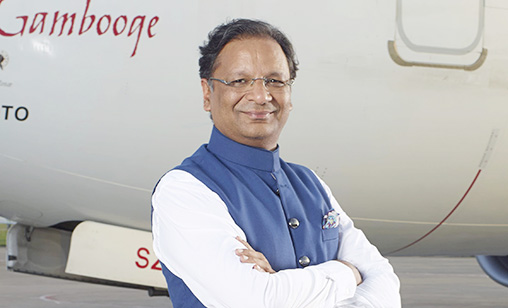Addendum
Will India’s SpiceJet survive?
August 23rd 2022
High oil prices, made more onerous by provincial government surcharges on airline fuel, and other operating challenges are playing havoc with airline economics in India. Read More » One airline, SpiceJet, is constantly reported as near to collapse, reports Anjuli Bhargava from India.
At press time, SpiceJet announced it had settled a dispute with Goshawk Aviation Limited over the leases of a 737-800 and two 737 MAXs.
 |
To the airline’s critics it was one more indicator the LCC’s chairman and managing director, Ajay Singh, has his back firmly to the wall and that the financial fragility of the carrier was eating away at his recovery strategy. From another perspective, the deal demonstrates SpiceJet is solving some of its problems.
Almost daily the LCC is in the news, but for the wrong reasons. Its aircraft have been plagued by technical issues to the point that India’s director general of civil aviation requested the airline to restrict its flying to 50% of its approved departures.
Lessors continue to demand return of their aircraft because of late lease payments. Some, but not all SpiceJet pilots, are disillusioned and are quitting if alternative jobs are available. Across the LCC’s supply chain, creditors are clamouring for settlement of outstanding invoices.
Overall, the airline’s prospects of weathering the present storm look slimmer with each passing day.
But profitless growth seems to be the mantra of India’s carriers. The latest Tata Sons annual report shows it’s AirAsia India and Vistara joint venture subsidiaries widened annual losses to March 31 with suddenly higher oil prices and the Russia-Ukraine war adding to the pain of the pandemic.
In India, Singh and SpiceJet are a particular focus of the industry’s pundits. They predict Singh’s run of good luck since he famously bought the LCC for two rupees in 2014-2015 is souring.
Soon after Singh took charge of the airline from the Maran family - it was clearly not their cup of tea - luck did play a part in where Singh found himself.
After he took charge, the grateful Marans invested millions to keep the carrier afloat while the new owner restructured the LCC.
A major stroke of luck at the time was that record high oil prices began to come off the top not long into Singh’s stewardship.
But to fair, he also made his own luck. In a series of quick decisions and renegotiations, Singh turned around the LCC.
The airline expanded its fleet and route network. Its load factor numbers became robust leading to a run of profitable quarters. In 2017, business prospects were so good Singh ordered 200 MAXs from Boeing: 55 firm commitments and the remainder in options.
But two fatal 737 MAX crashes and the subsequent global grounding of the type in March 2019 marked the beginning of the end of Singh’s winning streak. When regulators ordered Boeing to stop deliveries worldwide of the type, Singh’s plan to rebuild SpiceJet with fuel efficient MAXs ground to a damaging halt. If Boeing had been able to adhere to its original delivery schedule, SpiceJet would be sitting on a pile of cash today, thanks to income from the sale and lease back of the aircraft.
By March 2020, as COVID-19 spread beyond China, it no longer mattered if a carrier had any aircraft since almost all scheduled airline operations around the world were close to zero.
By December 2020, the grounded MAX type was cleared for flying in the U.S. with other jurisdictions to follow. But the wider consequences of the crashes and other crises at Boeing delayed MAX deliveries to customers, including SpiceJet.
On June 14 this year, Singh, purported to be close to India’s political leadership, publicly exhorted the national government to ease the pain of the country’s airlines, specifically their ability to operate as oil prices soared from February this year. His plea went nowhere.
Singh would most certainly lose any India-wide popularity contest, but there exists a grudging respect for him at airlines and beyond for his ability to survive when the odds are stacked against him.
SpiceJet old-timers of almost two decades continue to remind the airline’s doomsayers the brand and the product have proven resilient despite ownership changes.
In their minds, it is largely irrelevant who steers the airline back to financial stability.
A mass exodus of employees, including pilots, has not materialized although some senior commanders, always in demand, have departed to rival carriers.
The airline’s present losses are near Rs 3500 crore and passengers report signs of neglect in the cabin. It is widely reported the airline is seeking investors, so far without apparent success.
Meanwhile, Singh continues to negotiate with creditors about reducing costs and is believed to be betting on monetising SpiceJet’s cargo subsidiary, built up during the pandemic, as collateral for any deals made.
Will he prove his naysayers wrong, despite the forbidding financial challenges he must overcome, and keep SpiceJet alive? Maybe.
megan moroney says:
January 27th 2024 05:58pm